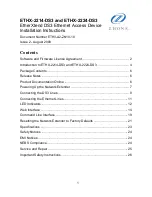
9
authentication default
Use
authentication default
to configure the default authentication method for an ISP domain.
Use
undo authentication default
to restore the default.
Syntax
authentication default
{
hwtacacs-scheme
hwtacacs-scheme-name
[
local
] |
local
|
none
|
radius-scheme
radius-scheme-name
[
local
] }
undo authentication default
Default
The default authentication method of an ISP domain is
local
.
Views
ISP domain view
Default command level
2: System level
Parameters
hwtacacs-scheme
hwtacacs-scheme-name
: Specifies an HWTACACS scheme by its name, a
case-insensitive string of 1 to 32 characters.
local
: Performs local authentication.
none
: Does not perform any authentication.
radius-scheme
radius-scheme-name
: Specifies a RADIUS scheme by its name, a case-insensitive
string of 1 to 32 characters.
Usage guidelines
The specified RADIUS or HWTACACS scheme must have been configured.
The default authentication method is used for all users who support the specified authentication
method and have no specific authentication method configured.
Examples
# Configure the default authentication method for ISP domain
test
to use RADIUS authentication
scheme
rd
and use local authentication as the backup.
<Sysname> system-view
[Sysname] domain test
[Sysname-isp-test] authentication default radius-scheme rd local
Related commands
•
local-user
•
hwtacacs
scheme
•
radius
scheme
authentication dvpn
Use
authentication dvpn
to configure the authentication method for DVPN users.
Use
undo authentication dvpn
to restore the default.
Syntax
authentication dvpn
{
local
|
none
|
radius-scheme
radius-scheme-name
[
local
] }
















































